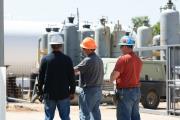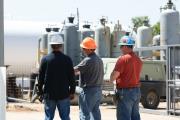|
Monday, November 28, 2022
 Typically, persons think of employee whistleblower claims in terms of their employer or supervisor violating a law. Sometimes, however, an employee may reasonably believe that a co-worker is breaking the law. The NJ Supreme Court held that minor infractions that violate company policies are not "unlawful conduct” as contemplated by New Jersey’s employee whistleblower statute, the Conscientious Employee Protection Act , N.J.S. Read more . . .
Monday, November 21, 2022
 Even today in 2022, many LGBTQ, non-binary, non-cisgender, gender non-conforming employees fearing discrimination in their workplace, keep their relationships private. A recent comprehensive study by a collaboration of independent and non-partisan research groups found that LGBTQ individuals fear potential discrimination due to their gender identity and/or sexual orientation and choose to hold back on disclosing their relationship status to others within their workplace. Although the survey found that discrimination events occurred frequently in public places and in some in educational facilities and rental housing, a whopping 36 percent of the discrimination reported was in the workplace. Among transgendered individuals, the reported discrimination increased dramatically to over 60 percent. Older generations, Generation X and Baby-boomers reported the most occurrences of discrimination overall occurred in the workplace, while Generation Z reported most discrimination took place in educational facilities. Read more . . .
Monday, November 14, 2022
 NJ Employees who experience discrimination in the workplace because of their sex may have multiple claims. They can file directly in NJ State Court under NJ’s anti-discrimination statute and avoid having to first jump through the delay of time-consuming administrative hurdles. In addition, the NJ statute, The New Jersey Law Against Discrimination, can award treble damages in some instances. The New Jersey Law Against Discrimination ( NJLAD) is considered by many to be the strongest employee protection law in the United States . The NJLAD has employment protections similar to the federal law, Title VII of the Civil Rights Act, which prohibits an employer from treating an employee differently, or less favorably, because of your sex. Read more . . .
Monday, November 7, 2022
 The dilution of the voting power of Black voters is at issue for the 2022 midterm elections in a case currently before the Supreme Court. In Merrill v. Mulligan, in a challenge to a redistricting map drawn by the state of Alabama, civil rights organizations and group of Black voters claim that a re-redistricting map drawn by and sought to be enforced by the State of Alabama dilutes the voting power of Black Alabamans for the 2022 midterm election cycle and beyond. Alabama has a long history of Black voter suppression. The Uniform Congressional District Act and Gerrymandering In December 1967, single-member House of Representative districts were mandated by Federal law pursuant to the Uniform Congressional District Act (2 U. Read more . . .
Monday, October 31, 2022
 The US Supreme Court ruled that a Congressional redistricting plan in Alabama, whose opponents argue dilutes the voting power of Black Alabama voters, may remain to be used in Alabama for the 2022 midterm elections. The State of Alabama, based on its population, is currently divided into seven (7) congressional districts, each represented by a member of the United States House of Representatives. Blacks comprise approximately 27 percent of Alabama’s voting age population. Under the Congressional District Map sought to be used by Alabama, a state with a long history of extreme Black voter suppression, Alabama drew the congressional district lines in a manner so that only one district out of seven would have a majority of Blacks. Challengers to this map asked for lines to be redrawn so that there will be two (2) voting districts that are comprised of a Black majority. Read more . . .
Monday, October 24, 2022
 The Current Supreme Court Case Regarding the Drawing of Congressional Maps and the Voting Rights Act, May Subsequently Affect All Civil Rights Statutes and Employment Discrimination Laws. On October 4, 2022, the US Supreme Court heard oral arguments in Merrill v. Milligan, et al., a case seeking to maintain a state’s discriminatory congressional map and undermine Section 2 of the Voting Rights Act. In Merrill v. Read more . . .
Monday, October 17, 2022
 Recently, the US Supreme Court in Dobbs v. Jackson Women’s Health Organization, decided June 24, 2022 overturned the long-established precedent of a woman’s Constitutional right to an abortion, thereby returning the issue of abortion rights left to be decided by individual states. When important legal issues are left to individual states to decide, it gives rise to a vast discrepancy in the breadth of legal rights (or in some situations, no legal right) granted to an individual dependent on which state the person resides in, although the facts of two such individuals living in different states may otherwise be identical facts. The Court in Dobbs overturned the 50-year-old legal precedent of Roe v. Wade, 410 U. Read more . . .
Monday, October 10, 2022
 There are numerous federal and various state statues which mandate legal protection for an employee who complains about or refuses to participate in fraudulent activities of the employer. Each statute has different specific facts that must be pled and must be proven to ultimately prevail on a case filed under that particular statute. Some statutes are extremely detailed and specific as to what is required to file and prevail on a claim. New Jersey however has its own whistleblower statute, the Conscientious Employee Protection Act N.J. Read more . . .
Monday, October 3, 2022
 Many employees want to complain to their employer about illegal acts or business practices, but they are not sure what their rights are when they cannot name the exact law or give a legal citation to the statute being broken, at the time they complain. This is quite common and understandable, because persons often may know there is illegality being committed even when they cannot cite to the exact statute, i.e., employees from restaurants are instructed to dump vats of used cooking oil in the Hackensack River rather than have employer pay to legally dispose of them; medical personal being instructed to change dates or data on medical reports to avoid medical malpractice suits; misrepresenting figures to defraud shareholders. This firm has a long history of aggressively and successfully representing employee-whistleblowers and receiving multiple six-figure monetary compensation for whistleblowers. Read more . . .
Monday, September 26, 2022
 All employees fear repercussions when they complain to their employers about what they believe to be the employer’s dangerous activities which they fear could lead to harm of other employees or to the public. This is particularly true for female executives who may not be taken as seriously when expressing their concerns as would be similarly-situated male executives due to inherent sex-based bias in our culture. Recently, a female executive who was a policy official on a team for a major internet company, is an extreme example of a female executive having her concerns ignored by the employer. The female executive in her employment position was responsible for designing the company’s internet content moderation rules. She had growing concerns that the company’s practices were causing a public harm and could lead to grave future harm. Read more . . .
Monday, September 19, 2022
 Many persons have been wondering about their federal and state employment and collective bargaining rights. Justice Ketanji Brown Jackson has a long history of issuing fair and balanced judicial decisions including those that effect employees’ rights and collective bargaining. Prior to her being appointed to the US Supreme Court, Judge Jackson had to decide in AFGE whether a President’s Orders were legitimate exercises of his authority. Part I on AFGE, may be read here for continuity. Her long history of issuing decisions that were both fair and balanced, was again displayed in this matter. Read more . . .
|

|
|
|